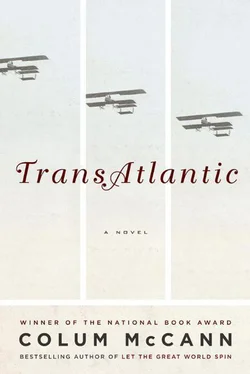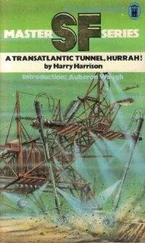He thought he knew now what had brought him here — the chance to explore what it felt like to be free and captive at the same time. It was not something even the most aggrieved Irishman could understand. To be in bondage to everything, even the idea of one’s own peace.
His body, his mind, his soul, had, for years, served only for the profit of others. He had his own people to whom he was pledged. Three million. They were the currency of his freedom. What weight would he carry if he tried to support the Irish, too? Their agonies, their ambiguities. He had enough of his own.
The barges passed.
A river of food afloat.
The sun went down over the slate rooftops of Cork.
THERE WAS A story he sometimes told his audiences. The slave masters in America used barrels. Bourbon mostly. Olive oil. Wine. Any sort of barrel that could be found. They drove large six-inch nails into the wood. Sometimes they placed crushed glass inside the barrel, too. Or thorny bushes. Then, he said, they would bring their slave —he always invoked this word on a deeper pitch — up to the top of a hill. For the most minor of offenses. Maybe she had forgotten to lock the stable door. Or perhaps she had dropped a piece of crockery. Or maybe she had looked askance at the mistress of the house. Or maybe she had left a dishcloth dirty. It did not matter. She was to be punished. It was the natural order of things.
Halfway through his story he would give the slave a name: Mary. He would hear a silence come over his Irish listeners. Mary, he said again.
And then the owners —this word volleyed savagely from him — forced Mary to take the barrel from the barn. It was rolled out into the dust, along the dirt road, to the top of a small nearby hill. They gathered the other slaves together and brought them, too, to the hilltop. To witness. The owners would often shout verses from the Holy Book. They forced Mary to step inside the wooden barrel. They pushed her head down, crushed her shoulders into it. The protruding nails ripped her body. The glass penetrated her feet. The thorns encircled her shoulders. Then the masters put the lid on and hammered it shut. They rocked it back and forth a few minutes. They read again from the Holy Book.
Then the barrel went down the hill, tumbling.
THE CROWDS WERE enormous. He had spoken alongside Father Mathew. He found a language in the temperance movement. The papers still called him the black O’Connell. Posters were pasted up all around the city. His fame spread, day by day. He picnicked with twenty-four women from the Cork Ladies Anti-Slavery Society: they delighted in the large lounge of him underneath a spreading oak tree, a dainty blue napkin at his throat, the gurgle of a brook behind him. The women unloosened the bonnets at their necks and raised their faces towards the sun. They hung on his every word. Later, the group walked together, carrying picnic baskets and parasols, out over the long grass and back towards a wooden bridge. Douglass dared to take off his shoes and socks and waded briefly in the cold water. The women turned away and giggled. The water darkened the cuffs of his trousers.
Newspaper reporters clamored to see him. Whole pages were devoted to his lectures. He had collected hundreds of pounds to be shipped back to Boston. He had sold over two thousand books. He would go on to Limerick next, then to Belfast. From there he would go to England where he would negotiate his freedom, buy himself back, return to America, a freeman.
There was a great welling inside him. His voice had always come from others, but when he stood to speak now, it felt more distinctly his own. There were times he wished he had a thousand voices and could throw them in so many directions, but he had just one, and it served a single purpose: to annihilate slavery. He was almost glad one afternoon when, walking past an ale house on Paul Street, he heard someone say that a nigger had just walked past, a filthy niggerboy , did he not have a home to go to, he wouldn’t find bananas in that direction, did he not know there were no trees to swing from in Cork, Cromwell had taken them all already, go on now, nigger .
He stopped, swelled his chest, held his ground, almost a fake fury, then walked on in his camel-hair vest. Nigger. Filthy nigger . For the first time, the word felt strangely welcome. An old shirt that he would have to wear in the future. Something to unbutton and tear off and rebutton again and again and again.
A FEW DAYS before he left Cork — a day that would stay with him quietly, a flag, a kite, a remnant — he heard a knocking at the door on Brown Street. He was in the midst of writing. His forearms were splattered with ink. His back ached from the bend over the desk. He pushed back in the chair and listened to the voices drifting up from below, then leaned into the work of writing once more.
Later that evening he bathed and dressed and descended the stairs for dinner. A young woman sat at the end of the table, next to Isabel. She seemed at odds with the manner with which she had been seated. Hunched, awkward, but pretty. With fair hair. Her skin so very pale. He thought he knew her, but he did not know from where. She stood up and said his name.
— Good evening, he replied, still confounded.
A hush came over the table. It was obvious to him that some other response was needed. He coughed into his fist.
— Such a pleasure to see you, Madame, he said.
He could feel the embarrassment swell the room.
— Lily is leaving for America, said Isabel.
It was then that he recognized her. She seemed so very different out of her uniform. Younger even. He remembered her shape on the stairs. She had, it seemed, left the employ of Mr. Webb and journeyed from Dublin.
— She will leave from Cove in a few days, said Isabel.
— That’s wonderful, said Douglass.
— She walked here.
— Good Lord.
— Lily was inspired by you. Isn’t that right, Lily?
— By me?
A small panic seized him. He could see a blush come over the young woman’s face. She seemed to want to vanish. He wondered if she had left Webb’s house without rancor. He certainly had not meant to cause consternation. He nodded politely, tried to avoid her gaze. He recalled with a sharp pang the way she had whispered good-bye. He was glad nothing more had come from his presence in Dublin.
— Your speeches, said Isabel. They were a great inspiration. Isn’t that right, Lily?
The maid didn’t look up.
— Boston? said Douglass. Is that your intention?
She nodded and by degrees lifted her head: a surprising shine to her eyes.
— Perhaps I’ll try New York, she said.
A murmur of approval went around the room. Douglass ate quickly, quietly. He kept his gaze on his plate, but glanced upwards every now and then to see Isabel and her sisters lavish attention on the young maid. They served her and poured her a ginger mineral from a pitcher.
The maid seemed to balance a weighing scale about her eyes: she seemed at any moment as if she could easily launch into a volley of words, or just as easily burst into tears.
When Douglass stood to excuse himself — he had more writing to do, he said — he raised a glass to Lily and said that he wished her well, that she would have Godspeed on her adventure, that he, too, hoped to return to his native land and to his wife and family soon.
The toast was taken up around the table. A clinking of water glasses. The maid flicked a brief glance at him: he was not sure if it was one of fear or anger. He made his way up the stairs. Her appearance had unnerved him. What exactly was he expected to do? How should he have reacted? He did indeed wish her well, but what more could he have said? Perhaps tomorrow he could recommend a prominent family for her to work with? Maybe Garrison or Chapman might know someone? Or he could suggest an area of the city where she would be at ease? Why, he wondered, had she come all the way to Cork by foot? And in such weather, too?
Читать дальше












